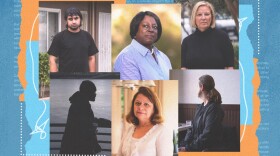LIANE HANSEN, host:
NPR's Ivan Watson is on the line from Qana. Ivan, can you please describe the scene there for us?
IVAN WATSON reporting:
Liane, rescue workers have been digging in the sagging ruins of a house, in the basement, with sticks and shovels to try to pull out at least 20 bodies that are estimated to still be in there. They have just brought in a bulldozer to try to clear that out a bit more. They've pulled at least 20 bodies out of there already, and half of those bodies are said to be children.
This village is on a hilltop. I would say nearly every house on this hilltop has been hit by some form of explosive, some kind of air strike. You have donkeys wandering around loose here, dogs barking, a lot of smashed vehicles here. There's some United Nations peacekeepers on the ground.
I spoke with one of them. He said there were no signs of Hezbollah fighters here. It appears to be a direct hit on a house where several civilians had taken shelter in the basement. And the U.N. peacekeeper said he did not understand why this would have been targeted.
HANSEN: Is there any sign of humanitarian aid coming in, more rescue operations? The roads are bad and the Israeli prime minister had said he's going to try and get some humanitarian aid in there. Can you see any signs of any more people coming in to help?
WATSON: Well, at this stage, there's a large number of ambulance workers here to pull out the bodies. There are Lebanese army soldiers, there are United Nations Peacekeepers. So there is a big effort underway here to try to exhume the people that are buried underneath here.
I must add that by - in the town of Tyre, yesterday there was a mass grave buried for more than 30 people, that steady trickle of bodies that comes in from the air strikes and artillery strikes in the countryside over the past several weeks.
We did pass some trucks carrying some aid on the road down here. But it is still a very dangerous drive, with many Lebanese saying they simply won't go past the town of Sidon, which in normal circumstances is only about a half hour drive south of Beirut.
HANSEN: NPR's Ivan Watson in the village of Qana, in southern Lebanon. Ivan, thank you very much.
WATSON: You're welcome, Liane. Transcript provided by NPR, Copyright NPR.






